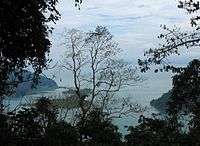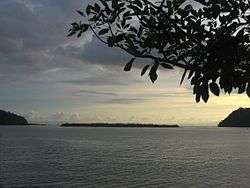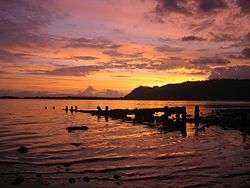Golfito
Golfito (literally 'little gulf') is a port town in Puntarenas Province on the southern Pacific Coast of Costa Rica, near the border of Panama. The town lies on a narrow strip of land between the eponymous bay and a hill and consists of two parts, the town proper and shopping area to the south, and a residential area near the port. Still further north are the duty-free zone and an airstrip.
Golfito | |
|---|---|
 A view of Golfito bay from the hill behind Golfito town, with Playa Cacao to the right and the Golfo Dulce in the background (beyond the peninsula) | |
 Golfito Location in Costa Rica | |
| Coordinates: 8°38′N 83°15′W | |
| Country | Costa Rica |
| Province | Puntarenas Province |
| Canton | Golfito |
| Elevation | 62 m (203 ft) |

Geography
From the northern section, which was the old United Fruit Company headquarters, trails go up to the Refugio Nacional de Vida Silvestre Golfito (Golfito Wildlife Refuge) on the hill, which is part of the National Parks of Costa Rica. Tall, 30–45 meters [98–148 ft] high, evergreen rain forests surround the coastal lowlands around the town. The region receives an average of 400–500 centimeters (160–200 in) of rainfall annually.
Golfito Bay (a tautonym because it means 'little bay bay') is within the larger Golfo Dulce, and separated from the open Pacific Ocean by the Osa Peninsula. Ferry boats cross the Golfo Dulce from Golfito to Puerto Jimenez, which is an access point to the Osa Peninsula and Corcovado National Park.
Economy
In the mid 20th century, Golfito was a major banana growing region (also resulting in it being a major port of southern Costa Rica), but a combination of worker unrest, declining foreign markets, rising export taxes and banana disease led to the closing of the United Fruit Company in 1985. Palm oil plantations have replaced the old banana plantations and, due to their success, more and more land is devoted to growing this palm. A small flow of tourists began to arrive in the mid-1990s, and by mid-2006 sport fishing had become the most important tourist attraction. A duty free shopping centre (Deposito Libre Comercial de Golfito) has attracted shoppers from other regions of the country, helping the local hospitality business.
The beaches in the region are beautiful. Calm water provides for tourist activities, even during the tide fluctuation, which averages about 3 meters (9.8 ft).
Education
The town of Golfito has 5 primary schools (1st–6th year), one secondary school (7th–12th year) that also offers a separate night schooling. The University of Costa Rica has a branch campus in Golfito where students mostly from the "Zona Sur" region attend. As a public university, UCR-Golfito offers scholarships and housing to about 90% of its students. UCR-Golfito has student housing facilities (called Bachers), a library, laboratories, and a student union called Club Centro, where art and recreational activities take place.
Golfito Tours
There's a lot of things you can do in Golfito such as Dolphin and whale watching boat tours, horseback riding, hiking tours to the Golfito Wildlife Refuge or the Piedras Blancas National Park and it's also a famous spot for bird watching tours and sportfishing.
Fishing and boating
The town offers small marinas, yachting and boating services, sport fishing, and a destination for cruise ships. Much of the tourism in the Golfito area focuses on the sport fishing industry. Many of the lodges and hotels have their own sport fishing boats and captains. Yachting, boating, water sports and beach activities are also possible. The beaches south of Golfito — Playa Zancudo, Pilon and Pavones — offer excellent surfing.
The controversial approval of permits for construction of a new big marina in Golfito was an unsuccessful process that lasted over nine years. Environmentalists and local residents opposed the project. Among the issues were the lack of a scientific study to determine the environmental impact of anti-fouling paint, sewage and oil spillage, and the lack of space to install a water treatment plant. The Regulatory Office for Marinas in Costa Rica (CIMAT) ordered the Golfito Municipality, in early 2010, to withdraw all permits for this marina project.
